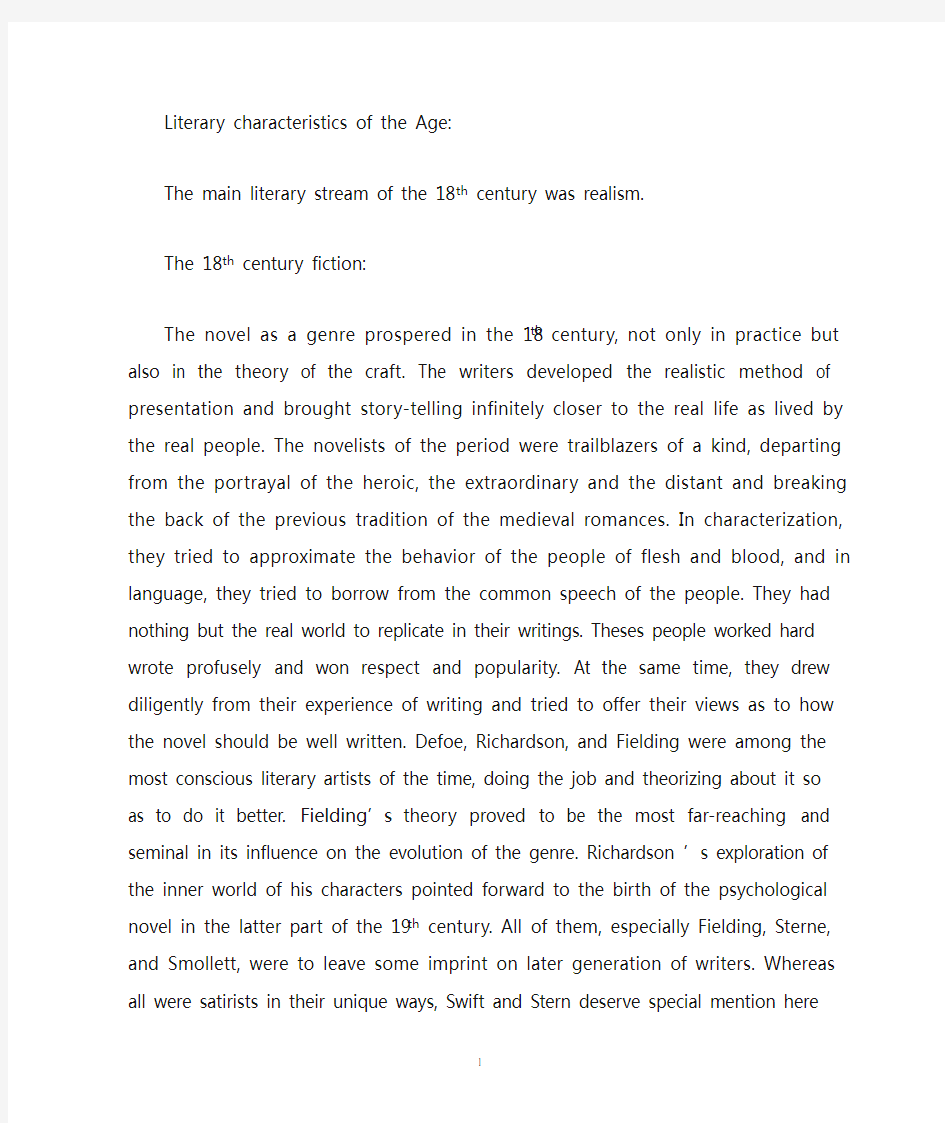十八世纪的文学的特点和小说

- 1、下载文档前请自行甄别文档内容的完整性,平台不提供额外的编辑、内容补充、找答案等附加服务。
- 2、"仅部分预览"的文档,不可在线预览部分如存在完整性等问题,可反馈申请退款(可完整预览的文档不适用该条件!)。
- 3、如文档侵犯您的权益,请联系客服反馈,我们会尽快为您处理(人工客服工作时间:9:00-18:30)。
Literary characteristics of the Age:
The main literary stream of the 18th century was realism.
The 18th century fiction:
The novel as a genre prospered in the 18th century, not only in practice but also in the theory of the craft. The writers developed the realistic method of presentation and brought story-telling infinitely closer to the real life as lived by the real people. The novelists of the period were trailblazers of a kind, departing from the portrayal of the heroic, the extraordinary and the distant and breaking the back of the previous tradition of the medieval romances. In characterization, they tried to approximate the behavior of the people of flesh and blood, and in language, they tried to borrow from the common speech of the people. They had nothing but the real world to replicate in their writings. Theses people worked hard wrote profusely and won respect and popularity. At the same time, they drew diligently from their experience of writing and tried to offer their views as to how the novel should be well written. Defoe, Richardson, and Fielding were among the most conscious literary artists of the time, doing the job and theorizing about it so as to do it better. Fielding’s theory proved to be the most far-reaching and seminal in its influence on the evolution of the genre. Richardson’s
exploration of the inner world of his characters pointed forward to the birth of the psychological novel in the latter part of the 19th century. All of them, especially Fielding, Sterne, and Smollett, were to leave some imprint on later generation of writers. Whereas all were satirists in their unique ways, Swift and Stern deserve special mention here as idealists, aware of the difference between reality they experienced and the ideal they envisioned, and trying to contribute toward improvement.
The 18th century English literature in terms of style:
More specifically or rather in terms of particulars, Eighteenth-century literature reflects the ideas and interests of the Age of Reason(理性), the Age of classicism(古典), the Age of elegance(优雅). Works show a sense of order and moderation(秩序;节制,适度); writers display their “wit,”(文采风度)or cleverness, but usually not their heart and soul. Prose arguments are calm and logical(冷静和逻辑); poems are carefully structured and often make classical allusions(结构缜密,喜好用典). Many writers satirize “elegant” society or politics(讽刺雅致社会和政治), but even when their humor grows bitter, they never abandon the detached, urbane (very polite and polished) tone of the eighteenth-century wit. (绝不
丢掉保持距离,礼貌和优雅的语气,而这正是所谓的文采风度)
The eighteenth century has been called the age of reason, for it was a time when prevailing philosophy argued that almost anything could be achieved through the calm workings of the human mind. It has been called the age of classicism, for it saw in all the arts a fascination with (an irresistible force of, the beauty of attraction of)ancient Greece and Rome. It has been called the age of elegance, for it displayed among the upper classes an elegant style of life, a style that ended when the effects of the Industrial Revolution became pronounced and the French Revolution destroyed the belief in an orderly hierarchy in society.
